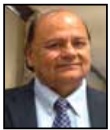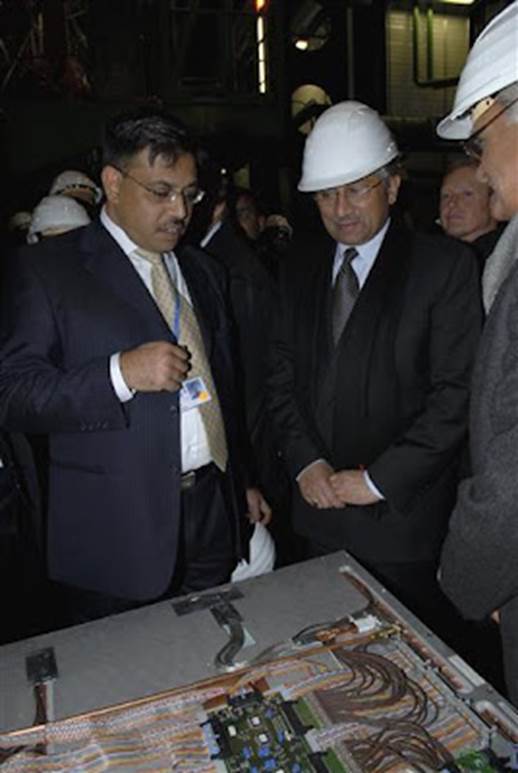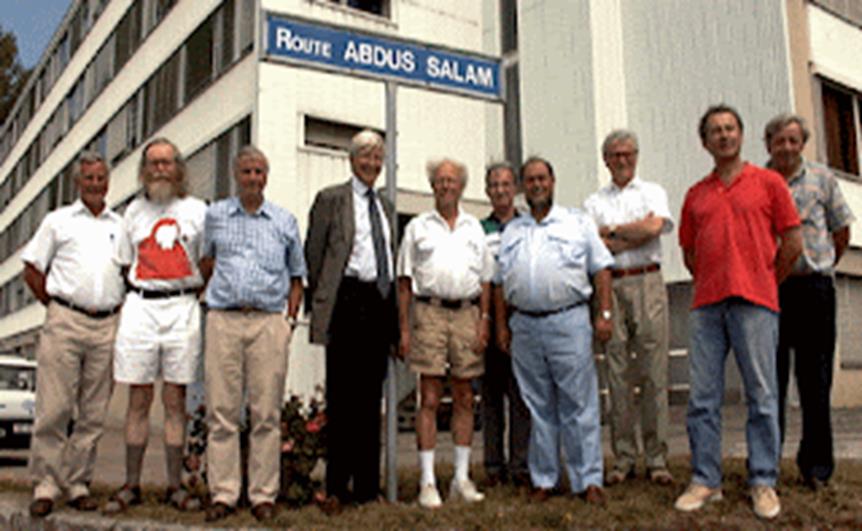

|
Beamline for Schools Competition Sponsored by CERN, Switzerland and DESY, Germany
|
Pakistani Students among Winners of International Competition Organized by Top European Research Labs
By Riaz Haq
CA

Top European Research Labs have announced the selection of three teams of high school students-- one each from Pakistan, the Netherlands and the United States-- to conduct accelerator beam experiments at CERN and DESY. They won the Beamline for Schools (BL4S), a physics competition open to secondary school pupils (Grade 9 to 12) from all around the world.
Pakistani and US teams will travel to CERN, Geneva, in September 2023 to perform the experiments they proposed. The Dutch team will be hosted by DESY in Hamburg, Germany.
This year's winning teams have been picked by a committee of CERN and DESY scientists from a shortlist of 27 particularly promising experiments. All the teams in the shortlist will be awarded special prizes. Besides, one team will be recognized for the most creative video and 10 teams for the quality of physics outreach activities they are organizing in their local communities, taking advantage of the knowledge gained by taking part in BL4S.
Pakistan's winning team named "Particular Perspective '' has drawn its members from the Islamabad College for Boys, Supernova School in Islamabad, the Cadet College in Hasanabdal, the Siddeeq Public School in Rawalpindi and the Cedar College in Karachi, Pakistan. Here's an excerpt from the joint announcement by CERN (Switzerland) and DESY (Germany):
"In 2023, for the second time in the history of the Beamline for Schools competition, the evaluation committee selected three winning teams. The team ‘Myriad Magnets’ from the Philips Exeter Academy, in Exeter, United States, and the team ‘Particular Perspective’, which brings together pupils from the Islamabad College for Boys, the Supernova School in Islamabad, the Cadet College in Hasanabdal, the Siddeeq Public School in Rawalpindi and the Cedar College in Karachi, Pakistan, will travel to CERN, Geneva, in September 2023 to perform the experiments that they proposed. The team ‘Wire Wizards’ from the Augustinianum School in Eindhoven, Netherlands, will be hosted at DESY (Deutsches Elektronen-Synchrotron in Hamburg, Germany) to carry out its experiment".
The Pakistan team “Particular Perspective” will measure in detail the beam composition of the T10 beamline of the CERN Proton Synchrotron accelerator. The experiment set-up they designed will make it possible to differentiate between different particle species and measure their intensity.
Recently, Pakistani students won more EU-funded Erasmus scholarships than students from any other country in the world. These are fully-funded scholarships for recipients to study at universities in the European Union. Pakistan has also seen a post-pandemic surge of student visas to study in Australia, the US and UK this year.
In 2014, Pakistan became the first Asian country and only the third in the world (outside of Western Europe) after Turkey and Serbia to be honored with CERN's associate membership . The status of associate member is a step before full membership. As an associate member, Pakistan is entitled to attend open and restricted sessions of the organization.
The CERN was founded in 1953 by 12 European nations including Belgium, Denmark, France, the Federal Republic of Germany, Greece, Italy, the Netherlands, Norway, Sweden, Switzerland, the United Kingdom and Yugoslavia. The organization was subsequently joined by Austria (1959), Spain (1961-1969, re-joined 1983), Portugal (1985), Finland (1991), Poland (1991), Czechoslovak Republic (1992), Hungary (1992), Bulgaria (1999) and Israel (2014). The Czech Republic and Slovak Republic re-joined CERN after their mutual independence in 1993. CERN now has 21 member states and Romania is a candidate to become a member state. Serbia is an associate member in the pre-stage to membership. "Observer" status allows non-member states to attend council meetings and to receive council documents, without taking part in the decision-making procedures of the organization. Over 600 institutes and universities around the world use CERN's facilities.
Pakistan's National Center for Physics (NCP) has been collaborating with CERN since 2000. Pakistan's associate membership application was unanimously approved at a meeting of the CERN council in 2014. The final approval came after a report of a CERN “fact-finding mission” to Pakistan in February 2014 was accepted.
CERN is leading the most high-profile effort to find "God Particle" about 300 ft below ground in a tunnel at the French-Swiss border. Buried there is a massive particle accelerator and super collider called LHC (Large Hadron Collider) run by CERN (European Organization of Nuclear Research), which has two beams of particles racing at nearly the speed of light in opposite directions and the resulting particles produced from collisions are being detected by massive detectors in the hope of experimentally finding the fundamental particle of which everything in the universe is built from: God Particle .

|
Dr Hafeez Hoorani and President Musharraf |
Among the world scientists working at CERN on LHC project is Professor Hafeez Hoorani of Pakistan's Quaid-i-Azam University in Islamabad. He is one of 27 Pakistani scientists at CERN. Hoorani has acknowledged that Pakistan government's support for Pakistani scientists' serious involvement at CERN materialized only after 1999, the year former President Musharraf's government assumed power. He also gives credit to Dr Abdus Salam, Pakistan's only Nobel Laureate, for inspiring him and his colleagues to pursue serious scientific research. Here's what Professor Hoorani says about Pakistan's involvement in LHC and CERN:
When I first came to CERN, I was mainly working on technical things but became increasingly involved in political issues. In 1999, I went back to Pakistan to set up a group working on different aspects of the LHC project. There I had to convince my people and my government to collaborate with CERN, which was rather difficult, since nobody associated science with Switzerland. It is known as a place for tourism, for its watches, and nice places to visit.
However, Pakistan already had an early connection to CERN through the late Abdus Salam , the sole Nobel laureate from Pakistan in science and one of the fathers of the electroweak theory. CERN has been known to the scientific community of Pakistan since 1973 through the discovery of neutral currents which eventually led to the Nobel Prize for Salam. We are contributing much more now because of the students who worked with Salam, who know his theories and CERN, and who are now placed at highly influential positions within the government of Pakistan. They have helped and pushed Pakistan towards a very meaningful scientific collaboration with CERN. People now know that there is an organization called CERN. It took a long time to explain what CERN is about, and I brought many people here to show them, because they did not imagine CERN this way. Many people support us now which gives us hope…”
In addition to the 27 scientists , Pakistan has made material contributions to the tune of $10m. Pakistan signed an agreement with CERN which doubled the Pakistani contribution from one to two million Swiss francs. And with this new agreement Pakistan started construction of the resistive plate chambers required for the CMS muon system. While more recently, a protocol has been signed enhancing Pakistan’s total contribution to the LHC program to $10 million.

Pakistan has contributed the LHC in numerous ways including some of the following in particular:
1. Detector construction
2. Detector simulation
3. Physics analysis
4. Grid computing
5. Computational software development
6. Manufacturing of mechanical equipment
7. Alignment of the CMS (Compact Muon Solenoid) tracker using lasers
8. Testing of electronic equipment
9. Barrel Yoke: 35 Ton each feet made in Pakistan
10. Assembly of CF (Carbon Fiber) Fins for the Silicon Tracker’s TOB (Tracker Outer Barrel).
11. 245 of the 300 CMS chambers required were made in Islamabad.
DESY (Deutsches Elektronen-Synchrotron) is a national research center for fundamental science located in Hamburg, Germany. It operates particle accelerators for investigating the structure, dynamics and function of matter, and conducts a broad spectrum of interdisciplinary scientific research in four main areas: particle and high energy physics; photon science; astro-particle physics; and the development, construction and operation of particle accelerators. Its name refers to its first project, an electron synchrotron.
(Riaz Haq is a Silicon Valley-based Pakistani-American analyst and writer. He blogs at www.riazhaq.com )

